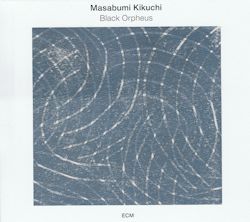1. Tokyo Part I
2. Tokyo Part II
3. Tokyo Part III
4. Tokyo Part IV
5. Tokyo Part V
6. Black Orpheus
7. Tokyo Part VI
8. Tokyo Part VII
9. Tokyo Part VIII
10. Tokyo Part IX
11. Little Abi
If I had to choose one word to describe the style on this recording of the Japanese pianist, Masabumi Kikuchi, who died in New York on the sixth of July
last year, that word would be 'ruminative'. If I wanted to embellish that description, however, I would have to add terms such as 'oblique' and '
idiosyncratic'. Kikuchi was influenced initially, both as a musician and a composer by Thelonious Monk and even on this last album, there remain traces of
the master. This solo concert, recorded in Tokyo in 2012 and just released, is, however, the last offering of someone who resolutely followed his own path.
His early associations were with the likes of Sonny Rollins, Gil Evans, Lionel Hampton, Woody Herman and Miles Davis but perhaps his most congenial
partnership was as co-leader, with bassist Gary Peacock and drummer Paul Motian, of the Tethered Moon trio. Together, they recorded seven albums between
1990 and 2002, several of them what is known as 'concept' albums, focussing on music identified with, for instance, Kurt Weill or Edith Piaf. This would
have been Kikuchi's most accessible period.
For this final disc, the only track not composed by Kikuchi himself is the music from the Brazilian film Black Orpheus, one of the most familiar
and engaging Latin jazz numbers around. Here, Kikuchi lovingly and lingeringly renders this beautiful tune, straight, no chaser. Ethan Iverson's
informative notes in the accompanying booklet refer to the reminder Kikuchi attached to his Steinway, namely, “Play slower, I sound better when I play
slower.” Black Orpheus is the perfect illustration of this approach. It makes an interesting contrast with the more upbeat versions of the same
piece, for example, the Paul Desmond/Jim Hall recording, which happens to be one of my personal favourites. Another classic on this disc is Little Abi, which Kikuchi wrote for his daughter many years ago. This, too, is a lovely melody which is played with feeling and finesse. There was
a notable response from the audience to both these performances.
I found the tracks numbered as Parts I to IX to be a different proposition. It's not that transcendent moments are lacking. Tokyo Part IV is well
worth hearing, offering here and there tantalising glimpses of melody. Likewise, Tokyo Part IX has occasional flashes which are reminiscent of
Keith Jarrett, commendation enough for most of us. And on Tokyo Part VII, Kikuchi captures an inner stillness in his limpid playing with its
sonorous deep notes. For the rest, however, it was too challenging a journey for this listener. To choose but one example, Tokyo Part VII tried my
patience and tolerance and, even at six and a half minutes, had me longing for an end. Elsewhere, there are too many thunderous chords, choppy
experimentalism or minimalist sprawl for my taste.
As a lover of jazz piano, there is enough of the remarkable Masabumi Kikuchi's talent here to help me appreciate just what a loss his passing represents.
The austere nature of about half of the material on this recording means, I suspect, that its reception will depend on how wide the musical boundaries are
drawn.
James Poore
